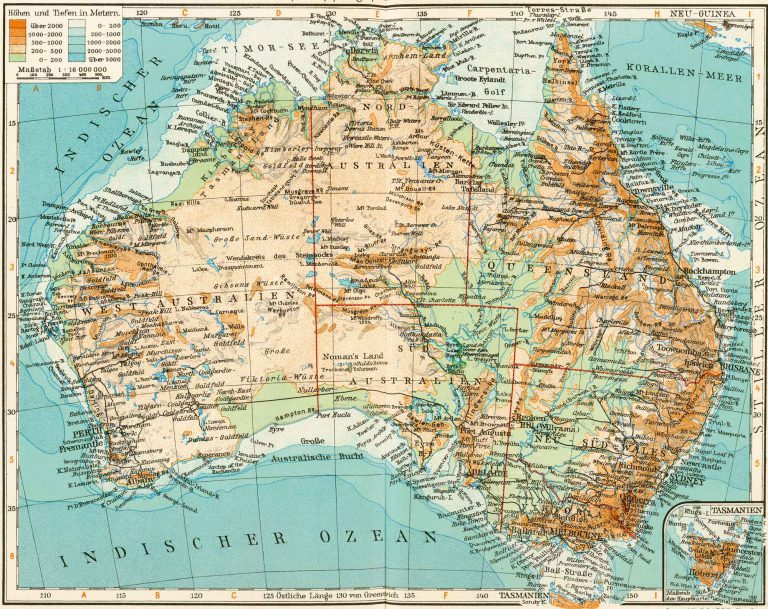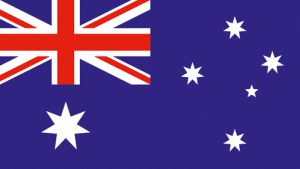
Australia
Policy on Immigration and Refugees
In January 1938 Australia celebrates the 150th anniversary of the landing of the “first fleet,” which brought British convicts to Australia. Since then, people of British and Irish heritage have constituted the vast majority of Australia’s white population. After the founding of the Federal Commonwealth of Australia in 1901, “White Australia” policies have been enshrined in law. The policies are aimed primarily against immigrants from China but actually affect all non-Europeans. In 1938 approximately 25,000 Jews live in Australia. Most have British origins, although there is also an East European Jewish community in Melbourne. The country is governed in 1938 by a conservative coalition under Prime Minister Joseph Lyons (United Australia Party).
The global economic crisis hits Australia hard, resulting in a curbing of immigration. In 1936, as the economy starts to recover, these restrictions are eased somewhat and, starting in 1938, immigration from Britain is even supported. Jewish refugees from Germany and Austria are generally subject to the same restrictive entry requirements as all other immigrants: People without close relatives in Australia may only enter the country if an Australian citizen guarantees their livelihood, if their economic activity does not burden Australian workers and if they can pay a landing fee of 50 Australian pounds. Immigrants without guarantors must pay 200 Australian pounds. In the case of Jewish refugees, the Australian Jewish Welfare Society may provide these guarantees.
These policies, to which the Australian government also adheres during the Évian Conference, are not controversial in Australia. However, the November pogrom changes public opinion: On December 1, 1938 the Australian government announces its willingness to take in a total of 15,000 refugees over the next three years. German and Austrian refugees benefit the most from this change in policy. However, the immigration authorities favor non-Jews and “non-Aryan” Christians.
While 1,556 refugees come to Australian in 1938, 5,080 arrive in 1939. With the outbreak of war, however, immigration comes to a standstill. By the end of 1939, Australia has taken in up to 8,000 refugees. During the war, some of these people are interned, along with the more than 2,000 refugees deported from Great Britain and South Asia to Australia, of which the majority are Jews. Only in 1942 does the government make an official distinction between “enemy aliens” and “refugee aliens.”
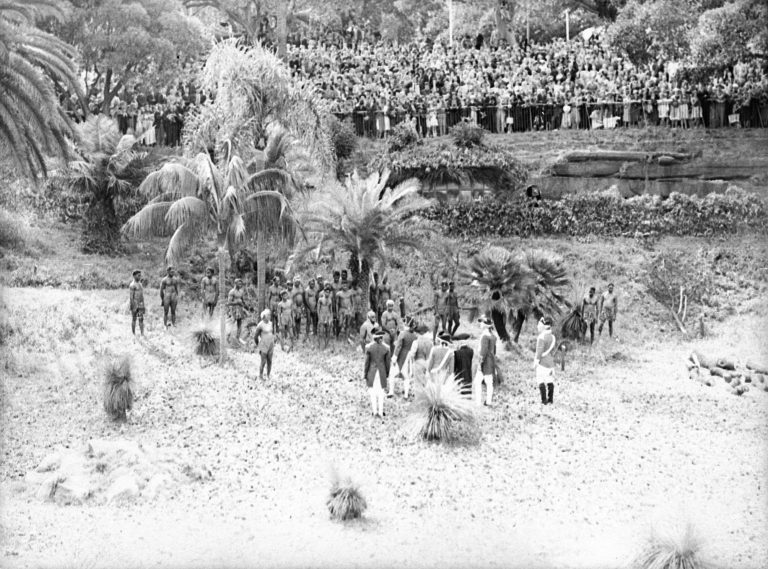
Onlookers watch the reenactment of the landing of the “first fleet” in Farm Cove, January 26, 1938
The self-perception of the majority of the population as “White Australia” is expressed in the celebrations marking the 150th anniversary of the arrival of the first British convicts in what is now Sydney. To this day, January 26 is celebrated as a national holiday, “Australia Day.”
State Library of New South Wales, Sydney
Onlookers watch the reenactment of the landing of the “first fleet” in Farm Cove, January 26, 1938
The self-perception of the majority of the population as “White Australia” is expressed in the celebrations marking the 150th anniversary of the arrival of the first British convicts in what is now Sydney. To this day, January 26 is celebrated as a national holiday, “Australia Day.”
State Library of New South Wales, Sydney

Representatives of the aborigines at a protest event
While “Australia Day” on January 26 is a day of joy for Australia’s white majority population, representatives of the aborigines proclaim it a “day of mourning” in 1938. They protest against land grabbing and discrimination and demand full civil rights for Australia’s native population.
State Library of New South Wales, Sydney
Representatives of the aborigines at a protest event
While “Australia Day” on January 26 is a day of joy for Australia’s white majority population, representatives of the aborigines proclaim it a “day of mourning” in 1938. They protest against land grabbing and discrimination and demand full civil rights for Australia’s native population.
State Library of New South Wales, Sydney
Delegation
Thomas Walter White
* 26 April 1888 North Melbourne † 13 October 1957 South Yarra
White joins the Australian armed forces in 1911. An aviator, he spends time as a prisoner of war in Ottoman captivity during World War I. His account of his escape becomes a bestseller in 1928. He runs a hardware store until, after several futile attempts, he is finally elected to parliament in 1929. In 1933 he becomes minister of trade and customs in the conservative coalition government of Joseph Lyons. As Australia’s representative in Évian, he is one of only two acting ministers among the conference participants.
On the way to Évian, he visits Germany in order to assess the danger of a possible German attack on Czechoslovakia. In his diary he refers to the leaders of the Nazi regime as “ruthless” and notes that they have eliminated political opponents either by murdering them or imprisoning them in concentration camps.
After serving in the Second World War, he becomes minister of air and civil aviation in 1949; in 1951, he takes over the post of Australian High Commissioner in London.
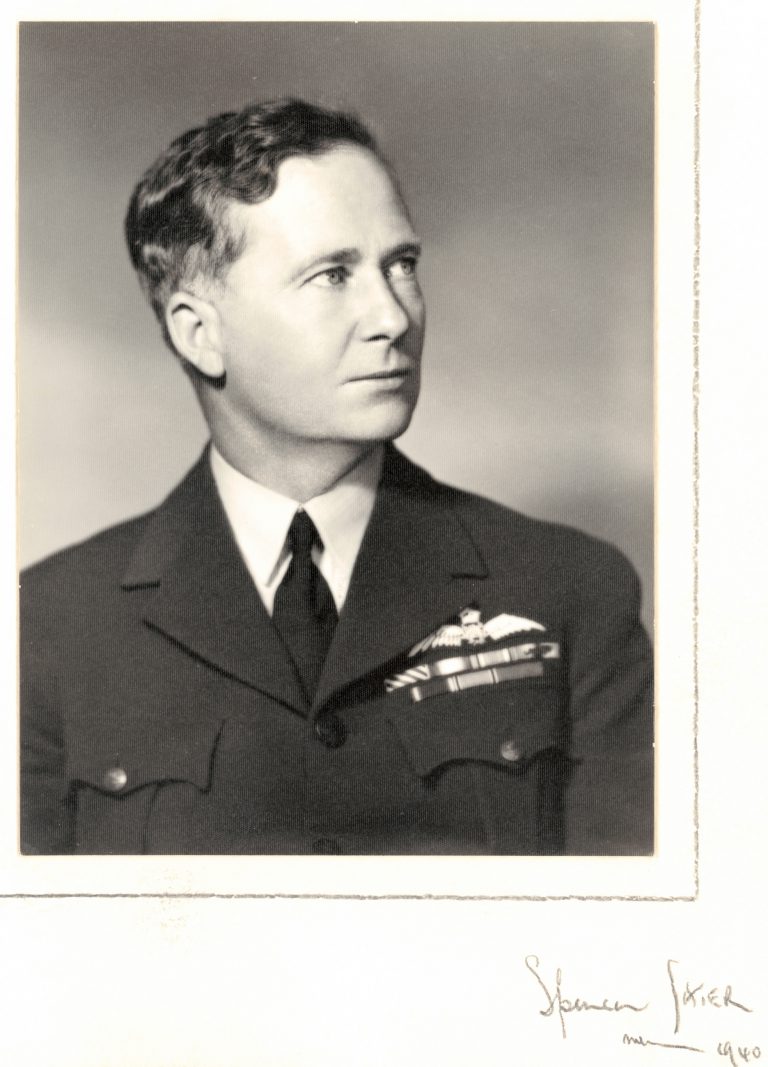
Thomas Walter White, 1940
Photo: Spencer Shier / National Library of Australia, Canberra
Thomas Walter White, 1940
Photo: Spencer Shier / National Library of Australia, Canberra
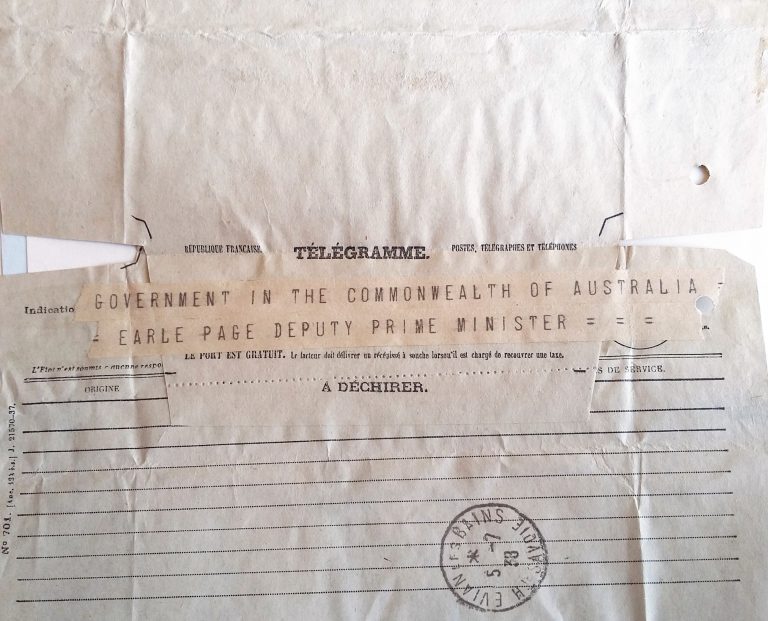
Earle Page, Australia’s deputy prime minister, to the general secretariat of the International Refugee Conference, July 5, 1938
The Australian regime decides to take part in the refugee conference at a very late date. Only one day before the conference begins, they announce that they will be represented in Évian by Minister of Trade and Customs Thomas Walter White. White is already in Europe to negotiate an economic agreement with Great Britain and will only attend the conference until July 9, 1938.
United Nations Archives, Genf
Earle Page, Australia’s deputy prime minister, to the general secretariat of the International Refugee Conference, July 5, 1938
The Australian regime decides to take part in the refugee conference at a very late date. Only one day before the conference begins, they announce that they will be represented in Évian by Minister of Trade and Customs Thomas Walter White. White is already in Europe to negotiate an economic agreement with Great Britain and will only attend the conference until July 9, 1938.
United Nations Archives, Genf
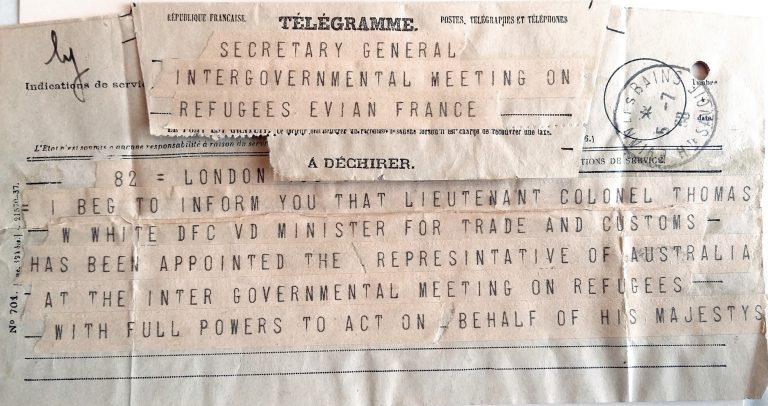
Earle Page, Australia’s deputy prime minister, to the general secretariat of the International Refugee Conference, July 5, 1938
The Australian regime decides to take part in the refugee conference at a very late date. Only one day before the conference begins, they announce that they will be represented in Évian by Minister of Trade and Customs Thomas Walter White. White is already in Europe to negotiate an economic agreement with Great Britain and will only attend the conference until July 9, 1938.
United Nations Archives, Genf
Earle Page, Australia’s deputy prime minister, to the general secretariat of the International Refugee Conference, July 5, 1938
The Australian regime decides to take part in the refugee conference at a very late date. Only one day before the conference begins, they announce that they will be represented in Évian by Minister of Trade and Customs Thomas Walter White. White is already in Europe to negotiate an economic agreement with Great Britain and will only attend the conference until July 9, 1938.
United Nations Archives, Genf
Alfred Thorpe Stirling
* 8 September 1902 Melbourne † 3 July 1981 East Melbourne
In 1927, after attending the prestigious Scotch College and studying at the universities of Melbourne and Oxford, Stirling joins the law firm of the future Australian prime minister Robert Menzies as a junior partner. When Menzies is appointed attorney general in 1934, he makes Stirling his private secretary. In 1936 Stirling switches to the newly formed Department of External Affairs and directs its political department for a year.
In 1937 he is transferred to Australia House, which represents Australia in London, and works closely with the Australian High Commissioner Stanley Melbourne Bruce until 1945. In Évian Stirling acts as Australia’s representative after the original delegate, Thomas White, leaves the conference on July 9, 1938. After 1945 Stirling serves briefly as Australia’s High Commissioner in both Canada and South Africa and then as ambassador to several countries, until retiring in 1967.
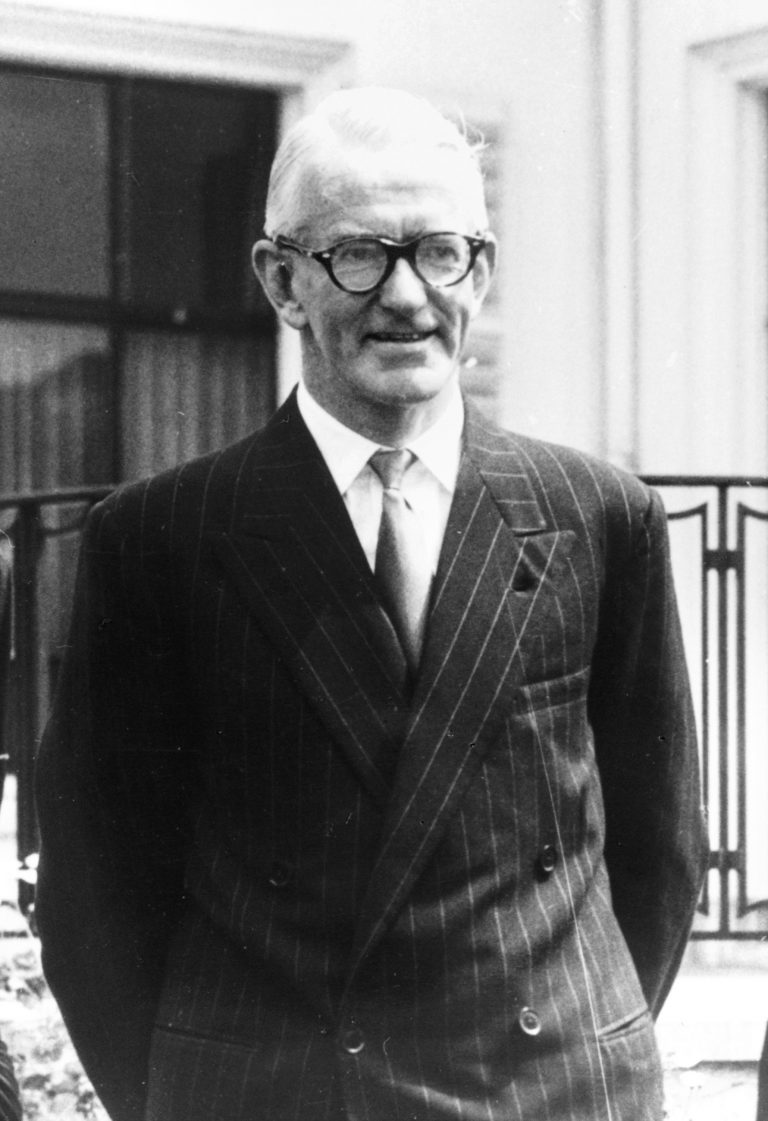
Alfred Thorpe Stirling in front of No. 10 Downing Street in London, ca. 1955
Department of Foreign Affairs and Trade, Canberra
Alfred Thorpe Stirling in front of No. 10 Downing Street in London, ca. 1955
Department of Foreign Affairs and Trade, Canberra
Conference Contributions
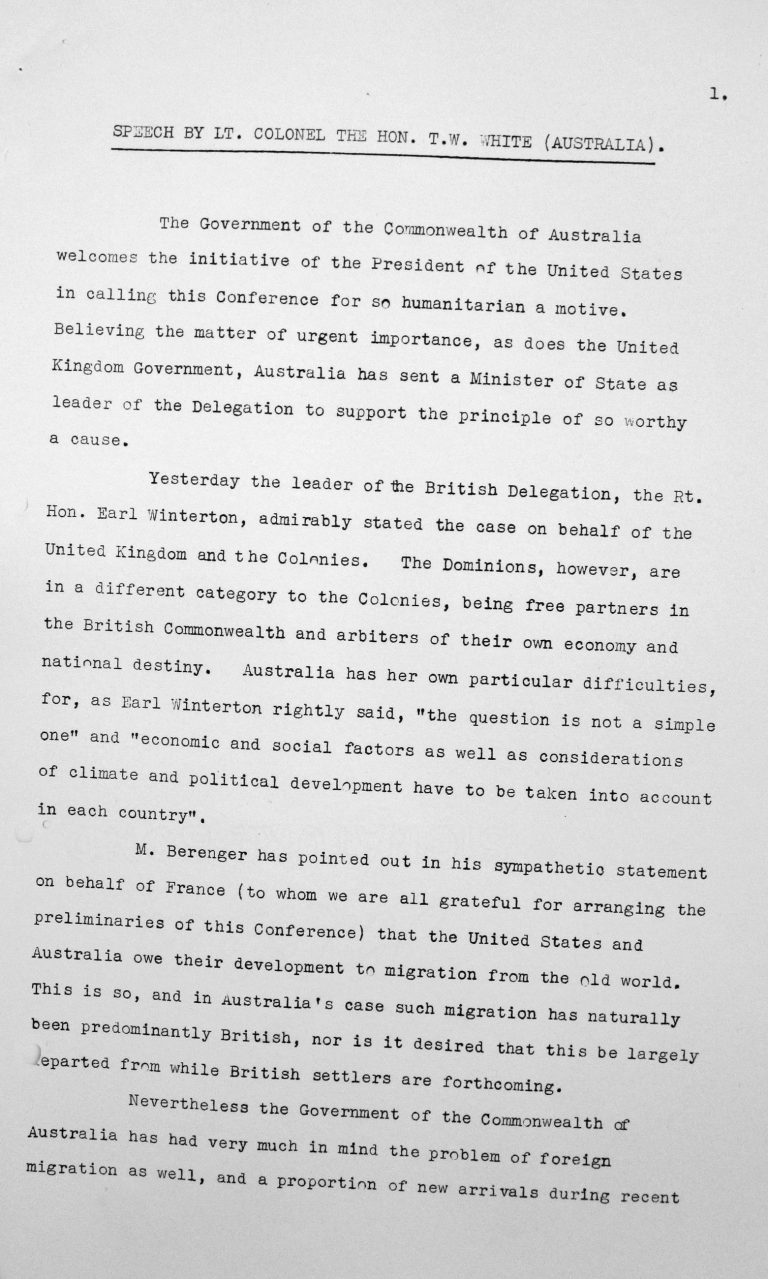
Speech by Lt. Colonel Thomas W. White (Australia) in the public session on July 7, 1938, 3.30pm, p. 1/2
Franklin D. Roosevelt Library, Hyde Park, NY
Speech by Lt. Colonel Thomas W. White (Australia) in the public session on July 7, 1938, 3.30pm, p. 1/2
Franklin D. Roosevelt Library, Hyde Park, NY
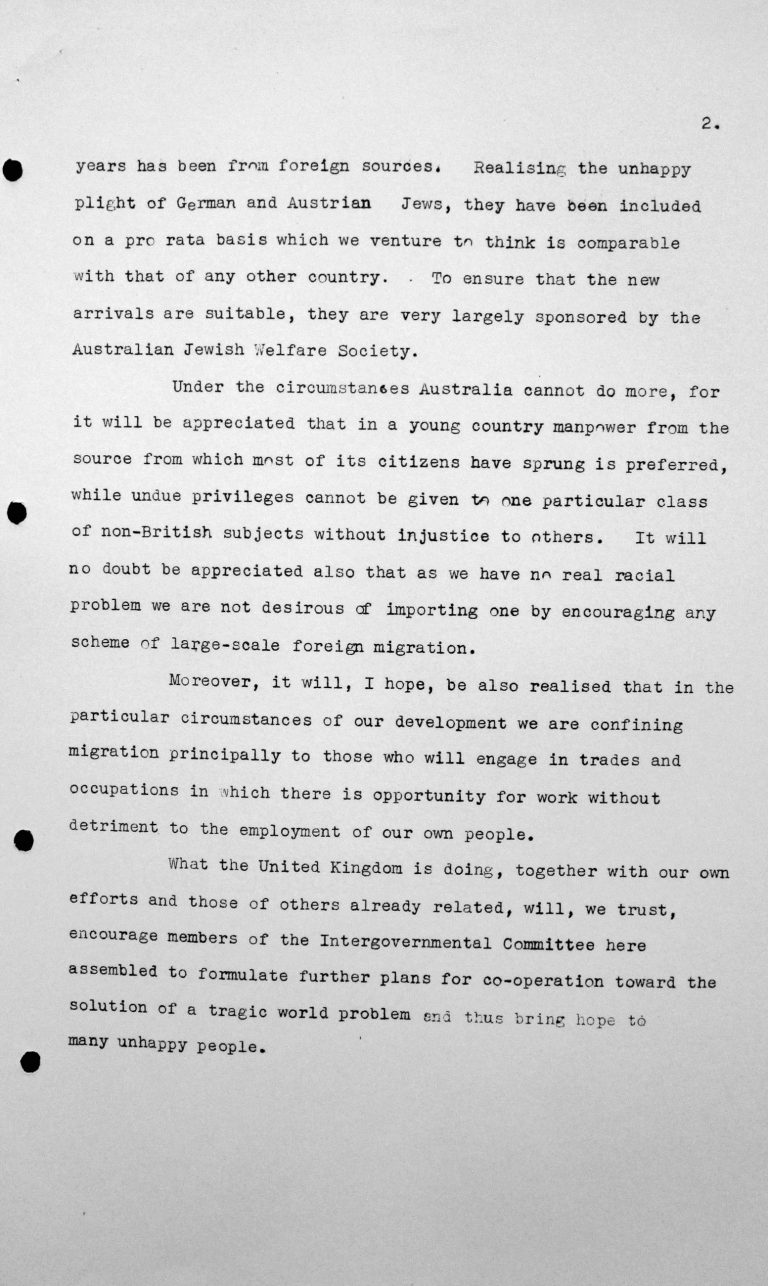
Speech by Lt. Colonel Thomas W. White (Australia) in the public session on July 7, 1938, 3.30pm, p. 2/2
Franklin D. Roosevelt Library, Hyde Park, NY
Speech by Lt. Colonel Thomas W. White (Australia) in the public session on July 7, 1938, 3.30pm, p. 2/2
Franklin D. Roosevelt Library, Hyde Park, NY
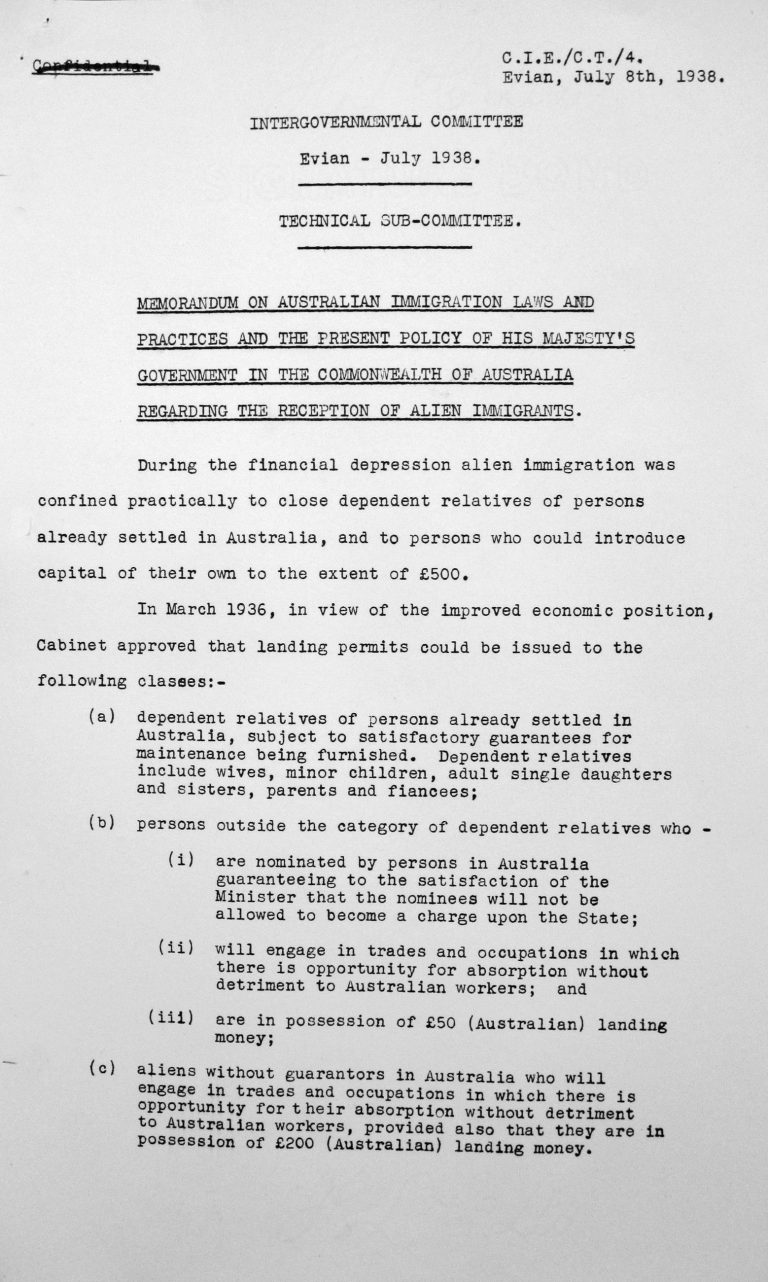
Memorandum for the Technical Sub-Committee on Australian immigration laws and practices and the present policy of His Majesty‘s Government in the Commonwealth of Australia regarding the reception of alien immigrants, July 8, 1938, p. 1/2
Franklin D. Roosevelt Library, Hyde Park, NY
Memorandum for the Technical Sub-Committee on Australian immigration laws and practices and the present policy of His Majesty‘s Government in the Commonwealth of Australia regarding the reception of alien immigrants, July 8, 1938, p. 1/2
Franklin D. Roosevelt Library, Hyde Park, NY
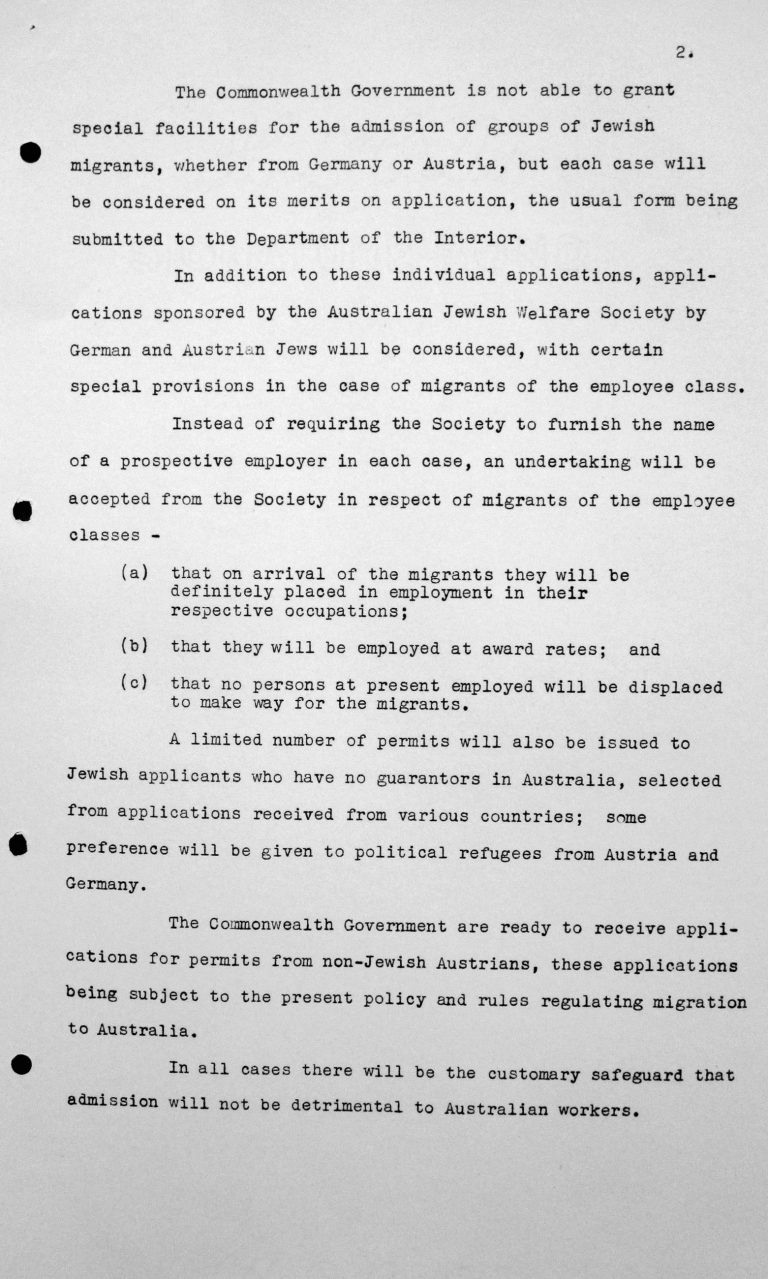
Memorandum for the Technical Sub-Committee on Australian immigration laws and practices and the present policy of His Majesty‘s Government in the Commonwealth of Australia regarding the reception of alien immigrants, July 8, 1938, p. 2/2
Franklin D. Roosevelt Library, Hyde Park, NY
Memorandum for the Technical Sub-Committee on Australian immigration laws and practices and the present policy of His Majesty‘s Government in the Commonwealth of Australia regarding the reception of alien immigrants, July 8, 1938, p. 2/2
Franklin D. Roosevelt Library, Hyde Park, NY
